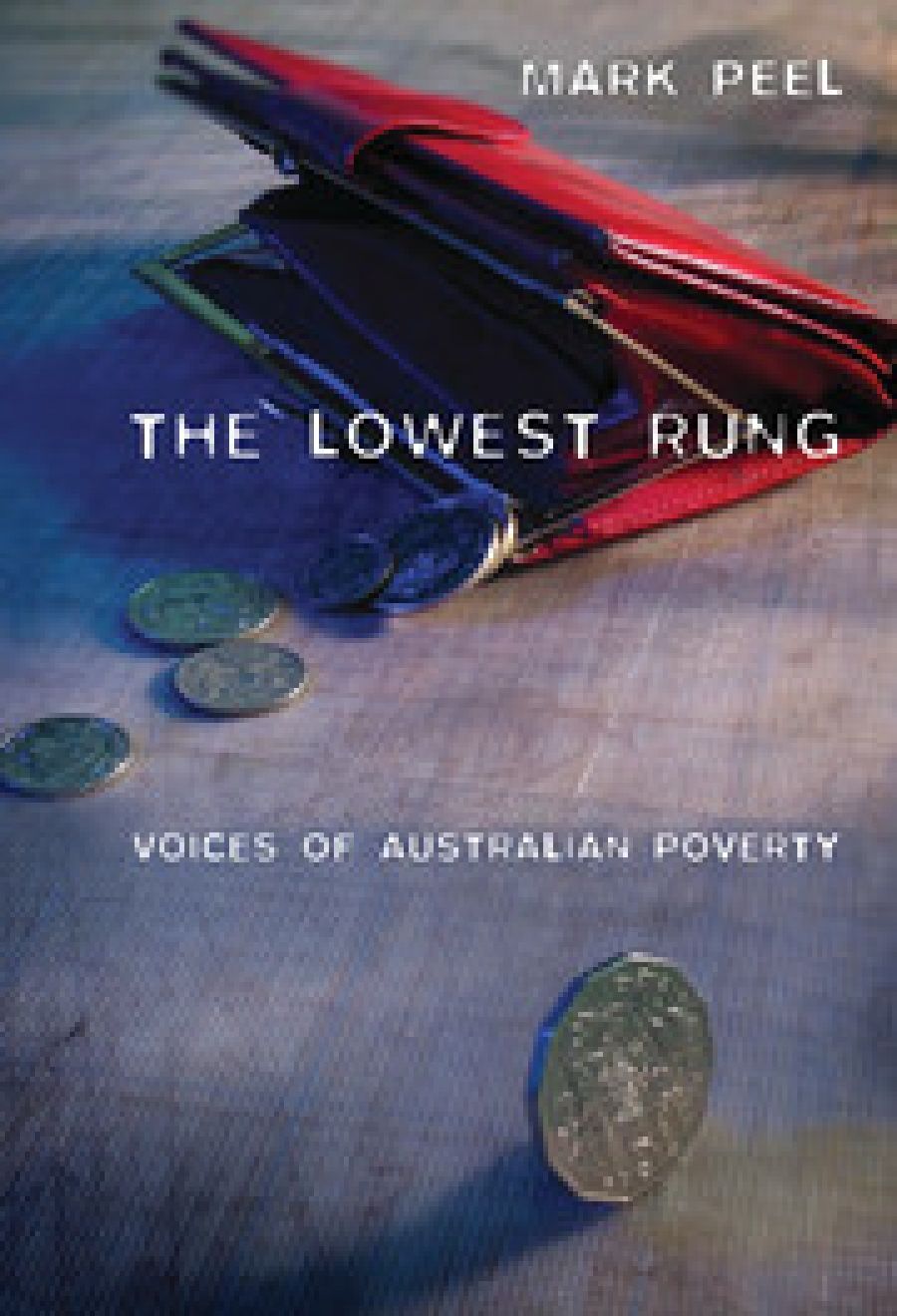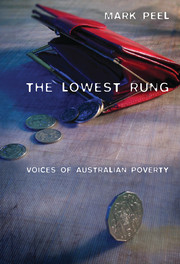
- Free Article: No
- Contents Category: Politics
- Review Article: Yes
- Article Title: The 30/30/40 Society
- Online Only: No
- Custom Highlight Text:
The 1990s will be remembered as the time when Australia slid into that morbid state of ‘new inequality’ that Will Hutton, writing about the British experience under Margaret Thatcher, called the ‘30/30/40 society’. In July 2003 the Australian Bureau of Statistics confirmed that income inequality had increased substantially during the 1990s. Whether a preoccupation with the ‘shrinking middle’, as Michael Pusey has recently argued, is therefore all that important is questionable. In Australia, one in four jobs are now part-time, and many are precarious. Persistent and long-term unemployment has contributed to the fact that one in three Australians are now relying substantially on government benefits. It is hardly surprising, therefore, that what Mark Peel in this new book calls ‘poverty news’ is back on the front page. By poverty news, Peel means the way Australia’s media has increasingly reported the problems occasioned by ‘welfare cheats’ since the late 1980s. Peel’s book challenges us to ask how we should think about poverty.
- Book 1 Title: The Lowest Rung
- Book 1 Subtitle: Voices of Australian poverty
- Book 1 Biblio: Cambridge University Press, $37.95pb, 222pp
- Book 1 Cover Small (400 x 600):

- Book 1 Cover (800 x 1200):

Peel’s book helps us to consider this issue. It is based on his interviews with some 300 people in three low-income Australian suburbs (Inala, Mount Druitt, and Broadmeadows), who tell him the stories of their lives. It is a timely book, partly because of what Peel rightly insists we need to do, and partly because of what he is not.
Peel is a sensitive social historian with a great capacity for listening to other people and for analysing what they tell him. Those qualities were on full display in Good Times, Hard Times (1995), his account of life in Elizabeth, a satellite town adjacent to Adelaide. That ear and thoughtfulness are again on display here, embedded in a fluent and precise way of writing uncommon among academics. (As Gerald Graff recently noted, too many academics write as if in fear that there will be an outbreak of clarity somewhere.)
Peel reminds us that the very idea of poverty and ‘the poor’ is implicated in the politics of naming people and problems, and this process is neither accidental nor random. The naming of a person or group of people locates them in certain social, legal or economic practices and shapes the level of respect they get. Though Peel observes that there are no agreed terms for Australia’s poorest citizens, there is a rough consensus about them, suggested by the reliance of academic researchers and welfare professionals on the language of poverty and the poor, and by the way Australians speak increasingly about ‘welfare dependants’.
There are, broadly speaking, two ways of doing social science. One involves theorising and finding ways of measuring things that cannot be seen. The other involves looking, listening, feeling and thinking. Economists mostly do counting and not much else. They hope – by, say, measuring poverty – to identify the poor. In consequence, much of the economic debate about poverty that has prevailed since the 1970s has degenerated into squabbles about which ‘poverty line’ is best. This is an irresolvable question since there is no quantitative benchmark for measuring the qualitative inadequacy of income against someone’s stated needs.
Welfarists mostly don’t listen very much; they also practise ‘social ventriloquism’. They decide what other people need based on their own compassion and the presumption that the poor are different from the rest of us. Welfarists such as Peter Hollingworth in the 1960s, or Jenny Trethewey in the 1980s, did research on the poor. Much of this was ‘qualitative’ research ostensibly designed to tell us what their lives were like. This kind of research, while seemingly about listening to people, is really done so as to allow the welfarists to claim the moral high ground. And they do this, initially, by talking about these people as ‘the poor’. Peel makes no such mistake. In short, Peel is neither an economist nor a welfarist. For this we can all be grateful.
Peel makes the highly relevant point that the people habitually referred to as ‘the poor’ do not describe themselves in this way and plainly resent being so described. As he says:
If those to whom I spoke were best characterized as disadvantaged, they mostly called themselves ‘ordinary’. Some people preferred the word ‘battlers’, though they were growing suspicious of a term twisted by conservatives to mean people who had more than they had.
Peel shows us why we need to resist talking about the poor, this category having been converted into the modern problem of welfare dependency. This idea, to our deep shame, now informs the contemporary policy régime of ‘mutual obligation’. Peel tells us what this means for the lives of the people he listened to.
On behalf of us all, governments do deeply hurtful things to low-income Australians. Peel reminds us that the people to whom this is being done do not like it. The underlying basis of that anger comes through powerfully in the interviews. Peel recalls that ‘people with whom I spoke had very good reasons for their angry distrust of a government that so often manifested its distrust of them. The very fact of their entitlement to help was a matter for constant and often intrusive investigation.’ One woman describes a contretemps with authorities:
I’ve had a terrible run in with them just recently when I said to them … Can I have a look at my own file?’ ‘Oh no, you’ve got to go through the Freedom of Information Act to see your file’ ‘That’s my file.’ I snatched it off the poor lady. I grabbed it and I looked through it and she didn’t know what to do with me …[I]t’s my file …This is my life. I want to know what you are saying about me.
Another Centrelink ‘customer’ put it simply: ‘We want a fair go. All we’re asking for is … to be treated with respect,[not] as that lower-class person.’
The practices of Centrelink and JobNetworks stigmatise those on social security payments. The Howard government says that these are people who do not participate in ‘ordinary life’ or ‘society’. (It says much about the commitment to evidence-based policy that research done by the Department of Family and Community Services in 2000 on a sample of 56,000 recipients for the McClure Committee showed that there were no differences between the social and economic participation of people who are on benefits and those who are not.) Peel reminds us that this is a policy ethos in which the core value that must inform any decent practice of citizenship is missing. That core value is not compassion, but respect.
In this fine book, Peel reminds us that there are Australians who experience inadequate income, misery, eviction, homelessness, distress, cold and hunger. Not having enough income is a real experience, but it does not conform to some economist’s construction of a scale of normal consumption. To understand this, we need to listen to what people having these experiences have to say. The Lowest Rung is a timely reminder of the value of doing so.


Comments powered by CComment